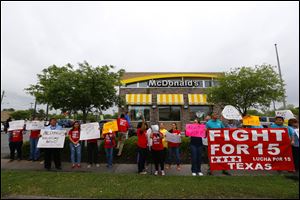
Workers: McDonald's raises too small
Employees also say too few workers are affected by increase
4/6/2015
Fast-food workers outside a McDonald's protest for higher wages Thursday in Houston.
NEW YORK — Julia Andino tried to ignore the insistent humming. It was after midnight and she was curled beneath the blankets alongside her sleeping child. But her cellphone kept vibrating. She tried to shake herself awake.
“Did you hear?” asked the excited voice on the line, a friend who eagerly recounted what she had just heard on the radio. “McDonald’s is giving everybody a raise!”
Now, Andino was really awake. A raise? A real raise? Her mind started whirring. Maybe she could pay the money she owed her babysitter and her overdue phone bill. Maybe she could start saving for a place of her own and move out of the single room that she shares with her 3-year-old son.
By Thursday morning, those hopes had deflated. Andino, who earns $8.75 an hour, the minimum wage in New York state, quickly learned that McDonald’s was only offering $1 an hour more than that. And the pay increase was only for employees of company-owned stores, not for employees such as Andino who worked at McDonald’s franchises.
But that did not stop Andino from feeling encouraged by the news. By 11 a.m. that day, she was demonstrating in Midtown Manhattan with dozens of other fast-food workers for better pay. The employees derided McDonald’s offer as too little money for too few employees, but they hailed the overture as proof that their protests were finally bearing fruit.
“We’re making progress,” said Andino, 20, who like many other workers continued to press McDonald’s and other retailers to increase wages to $15 an hour. “If we continue fighting, we’re going to end up winning.”
She might just be right. Over the past few months, one big-name company after another has announced pay increases for low-wage employees. The worker protests, coupled with a tighter job market, are changing the national conversation on wages.
In February, Wal-Mart, the nation’s largest private employer, announced that it would increase the hourly pay for a half-million employees to $9 an hour starting this month and to at least $10 by February. The week after Wal-Mart’s announcement, the owner of T.J.Maxx, Marshalls and HomeGoods stores promised to increase pay to at least $9 an hour in June. (The federal minimum wage is $7.25 an hour.)
Last month, Target joined the movement, promising at least $9 an hour for its workers. Last week, it was McDonald’s turn.
McDonald’s pledged to increase wages in its company-owned restaurants to at least $1 over local minimum wages around the country to an average of $9.90 an hour by July 1. The average will increase to more than $10 an hour in 2016. The company will also provide paid personal leave for employees who have worked for McDonald’s for more than a year and help pay the cost of college tuition and online classes that count toward high school diplomas. (The tuition assistance will also be offered to workers at McDonald’s franchises.)
Steve Easterbrook, the company’s chief executive, described it as “a comprehensive benefits package” for “the people who bring our brand to life for customers every day.”
But the raises would benefit only the 90,000 workers in the restaurants that McDonald’s owns and operates. The 750,000 employees who work for franchises around the country — workers like Andino — will see no increase in pay. (McDonald’s argues that it is not responsible for pay and other labor practices at its franchises. Last year, the general counsel of the National Labor Relations Board found otherwise, ruling that McDonald’s is a “joint employer” of franchise workers.)
And even those employees who work for company-owned restaurants may see little change in their paychecks. Consider Ashley Wiley, who works for a company-owned McDonald’s in Queens.
She earns $9.19 an hour. Under the new plan, her hourly pay will jump 56 cents.
“It’s not making a difference in my life at all,” said Wiley, 26, who relies on food stamps and Medicaid to help support her three sons.
That is why she and Andino plan to join thousands of other fast-food and retail workers on April 15 to press for a $15 hourly wage. Organizers predict that the fast-food strikes and protests, which started in New York 2 1/2 years ago, will draw more than 60,000 people in 200 cities nationwide that day.
These workers want real living wages and full-time jobs, which are still hard to come by. The average weekly hours of private-sector employees, which fell sharply during the Great Recession, are still falling in New York City, even in the midst of strong economic expansion, according to the Independent Budget Office.
Andino, who works in the kitchen at a McDonald’s franchise in Brooklyn, would love to work full time. But she is typically scheduled for only 20 to 25 hours a week, which often means less than $200 in take-home pay.
It is not nearly enough to cover the $857 monthly rent for the single room she shares with her son, or to pay for the babysitter, the groceries, the phone bill and her bus pass. So she puts off paying some bills and borrows money from family to pay others.
And she cheers herself with the hope that big changes — and real raises — are on the horizon.